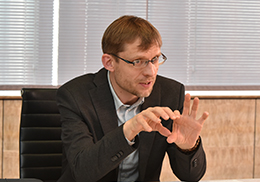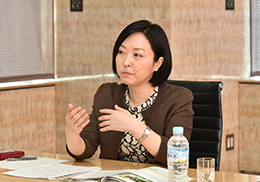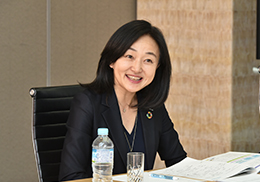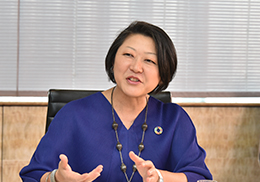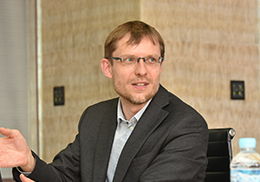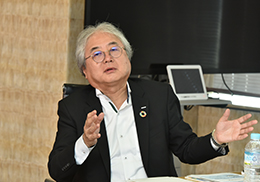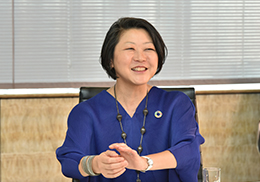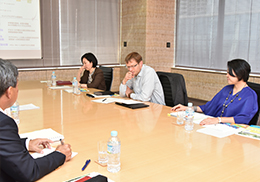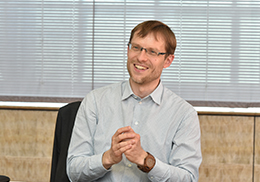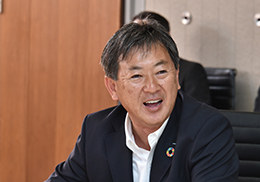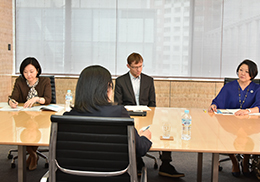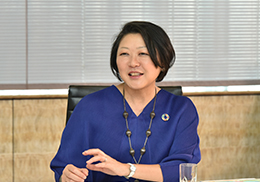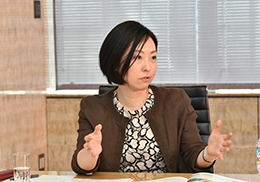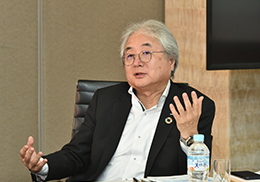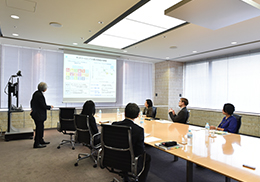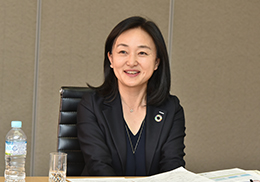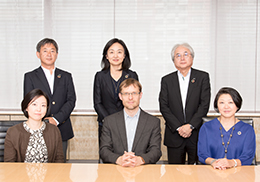Our dialogue with society introduces the sustainable management advocated by the Suntory Group and its worldwide water initiatives to a panel of experts to receive their critique and guidance in a roundtable discussion.
-
●Date: May 17, 2018
-
●Suntory World Headquarters (Odaiba Office)
Experts
-

Peter D. Pedersen
Co-founder of E-Square Inc.
Co-representative of NELIS -

Kaoru Nemoto
Director, United Nations Information Centre -

Mariko Mishiro
President, RIDEAL Co.
WICI Japan Board Member (Director)
Suntory
-

Tomomi Fukumoto
Executive Officer, Suntory Holdings Limited
Senior General Manager, Corporate Sustainability Division -
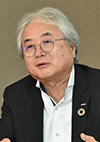
Kenji Naiki
Suntory Holdings Ltd.
Senior General Manager of Sustainability Promotion, Corporate Sustainability Division -
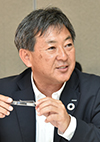
Masaki Tomioka
Suntory Holdings Ltd.
Senior General Manager, Corporate Brand Department, Corporate Sustainability Division
Moderator
Hidenori Imazu
Program Committee Member, Japan Forum of Business and Society
Awareness of Integration and an Overall Perspective Are Vital
- Moderator
- Today, I hope we can have a candid discussion from a global perspective about the SDGs and ESG initiatives which are part of Suntory Group’s sustainable management efforts. First, I would like to ask for your frank impressions and critiques about Suntory’s initiatives.
- Pedersen
- Suntory aims to be the top multi-faceted food and beverage company both trusted and adored throughout the world. In this endeavor, the long-term effort to establish Suntory as a Follow Your Nature company praised globally is excellent. These initiatives have really left an impression of evolution over the years. However, the one concern that I do have is about the alignment (consistency) of these efforts. The Suntory Group as a whole is made up of 52% non-Japanese employees with 41% of its revenue made in overseas markets. This means sharing the corporate philosophy throughout the entire Group is extremely important. I think disseminating information in English fully has to happen to ensure all overseas Group employees share the same vector.
- Nemoto
- The Suntory Group brings the Sharing Profit with Society and Good for Everyone founding spirits to its initiatives, but incorporating the Future and Earth into these founding spirits is important when working toward the SDGs. There are many different approaches to achieving the SDGs because these goals do not have one right answer, but we aim to share a vision for the ideal form in 2030. That is why I think the “Yatte Minahare” spirit aligns very well with the spirit of the SDGs.
- Mishiro
- The Suntory Group is not simply raising its philosophies in its reports but actually reporting on the specific efforts which put these philosophies into practice. A report can only offer so much insight. I have gained an even deeper understanding of Suntory’s initiatives through the in-depth explanation today. I can truly feel the level of emphasis Suntory is putting into having a dialogue with stakeholders as a company by providing opportunities for roundtables like this one. While most companies’ medium-term management plans in Japan have been three to five years up until now, the Suntory Group has put in place a long-term vision in anticipation of the next 20 to 30 years, which I think is fantastic.
- Tomioka
- Suntory is a company which began in the business of whisky, a drink that requires quite a bit of time to brew. I think this is why we have always valued a medium to long-term outlook. However, to fully flush out a future vision anticipating the next 20 to 30 years, the Suntory Group had to review its strengths over and over again to bring focus to the needs of the next generation. I think our next step is to consider the best way for us to move forward.
- Nemoto
- I do not see a clear point engaging Suntory employees in the materiality, which is a concern. As the ratio of overseas employees grows, personnel policies that respect diversity are important and encouraging an employment environment with gender equality is a must. If Suntory can incorporate the perspective for reducing disparities as a global company such as that defined in Goal 5: Gender Equality and Goal 10: Reduced inequalities in the SDGs, I think Suntory will see strong unity and less inconsistency in the management of the corporate group even in ESG investment areas. I can understand why a company with a livelihood founded in water would place emphasis on Goal 6: Clean Water and Sanitation, but Goal 16: Peace, Justice and Strong Institutions are very important in terms of governance while Goal 17: Partnerships for the Goals is vital in terms of financial resources. Looking at the overall picture of things with awareness toward integration based on these considerations would give even greater excellence to the efforts of Suntory.
- Mishiro
- One challenge which has been raised is the relevance with finance. Suntory has conducted a variety of activities from the perspective of ESG evaluations, but I would like to see the points illustrated about the specific financial impact of those efforts. As Peter Pedersen said earlier, the alignment of ESG and CSR activities as well as the financial aspects is important. In the future, I think sharing the corporate philosophy, activities and the stories precisely throughout the entire Group will be vital as the Suntory Group further expands its business globally. Out of curiosity, how are you translating “Yatte Minahare” in English?
- Fukumoto
- We actually use “Yatte Minahare” in English too. “Yatte Minahare” is not meant to only represent a challenging spirit but also to see decisions through to fruition and to confront challenges with persistence bearing down and never giving up. At first, we had translated “Yatte Minahare” as Go for It as a way to permeate the philosophy at overseas Group companies, but employees at overseas Group companies who had come to understand this founding spirit pointed out that Go for It did not fully represent the true meaning of “Yatte Minahare”. Therefore, if there is no appropriate English expression, we decided to take the same approach as Mottainai (“Don’t Waste”) and present “Yatte Minahare” as a unique Japanese concept. I think it is important to let our past history and the sincerity of the philosophy communicate its true meaning throughout the Group rather than trying to explain the meaning.
- Mishiro
- Japanese companies like Suntory which are expanding their businesses globally grow to have an employee base made up of more than 50% of its workforce overseas. It has always been difficult for Japanese companies to gain understanding about their philosophies overseas and many struggle to, but Suntory has really valued accurately communicating the true meaning and intention of its corporate philosophies.
Give Life to Strongly Localized Global Messages
- Moderator
- In the future, governance will become an area more and more scrutinized. Is there anything of particular note Suntory should consider when looking at governance overall as a global company?
- Mishiro
- I skimmed the Suntory Group CSR Communication Book. I know that this communication book is not currently designated as an integrated report, but I think more needs to be presented about the process of creating comprehensive value, such as in the supply chain after talking about the Governance aspect of ESG in the future. The type of governance necessary to further promote this process must be explained. I think the reporting would be more effective if Suntory could include how governance is helping to create value.
- Tomioka
- Informational sharing is of course important to facilitate understanding of everyone outside of the company, but communicating the corporate philosophy fully in a story-type format with everyone in the company first is vital. We started to build a framework to fully share stories while reviewing the current state of our corporate strategies today after their launch around the Follow Your Nature principle.
- Mishiro
- One of the first opportunities to create an integrated report is often the demand for a report that investors can understand easily. However, an integrated report is a tool which can be taken advantage of to heighten the level of management internally as you have said now in addition to providing investors with information. For instance, creating an integrated report from a long-term perspective is a chance for management to consider growth opportunities over a longer term than usual. In the case of Suntory, what is the growth opportunity for Suntory that begins with water?
- Naiki
- It has been more than 10 years since Suntory first raised the Follow Your Nature philosophy in 2005. Therein, we have clarified our policy toward water resources. The results of these various efforts to conserve water resources founded in that policy bring trust to the Suntory brand in Japan at the very least. However, further expanding the global corporate value through our Follow Your Nature ideal will still be a difficult task for us in the future.
- Fukumoto
- In the long term, sharing the Follow Your Nature philosophy and activities with the people who are the most valuable asset of any company is very profound. We have involved employees and built opportunities for first-hand experience in activities related to Follow Your Nature up until now. All of the 7,000 Group employees in Japan for example took part in the Natural Water Sanctuary First Hand Experience with Forestry. Although not fully yet, we are also expanding these activities in the same way around management at Group companies overseas. These experiences cultivate pride for the company, nurture a sense of unity and contribute to improving productivity when each employee goes back to work. Concurrently, those who take part work with more loyalty when their family as well as others around them talk favorably about the company. This image also plays a major role in securing the best human resources.
- Mishiro
- Expressing how the intangible benefits such as pride and motivation of the employees at the company which cannot be included in financial reports aid in creating medium to long-term value in the integrated report would be fantastic. I think having medium-term KPI for the financial impact in the future of the Suntory Mizuiku - Natural Water Education Program and the First Hand Experience with Forestry conducted currently would provide even greater understanding. The Suntory Mizuiku - Natural Water Education Program for example has significance in contributing to the region. The people who have taken and gained knowledge through this education may become the future human resources of Suntory when we consider the medium to long term. That would mean the program cultivates the people who are the source in creating the value of Suntory, which influences the long-term financial impact of those activities. I think Suntory would find even greater benefit the more these aspects of the activities can be brought to the surface.
- Pedersen
- An engagement survey may provide a means to indicate factors such as motivation and awareness of the philosophy quantitatively to offer more persuasive information. Online surveys can also be done at a very minimal expense to evaluate how the general consumer sees Suntory as well as two or three of its competitors from both social and environmental perspectives. Picking up data through these types of surveys would help bring true corporate value. As the Follow Your Nature philosophy and activities such as environmental and social contributions expand globally in the future, I think stationary observations about the changes through data can be done when communicating these initiatives with society.
- Nemoto
- The United Nations Information Centre is focused on localizing global messaging. Core messages gain strength when those concerned or involved take part in the creation process. SDGs for example were debated over 3 years by gathering together the various stakeholders from around the world and reflecting voices of an additional 10 million people through online surveys. The sense of ownership and an affinity toward the sustainable development goals which were drafter is impacting efforts even today with many people passionate about engaging in the SDGs. This involvement not only strengthens external communication but internal communication as well. I am sure Suntory would become even stronger as a corporate group by consulting with overseas subsidiaries as well as their employees when deciding on Group-wide policy.
- Fukumoto
- Thank you. We will use this insight when involving local employees as much as possible in the process of localizing our global messaging.
An Era Looking at the Entire Supply Chain from the Upstream
- Moderator
- Would everyone mind giving their assessment of the Suntory Group initiatives related to water both in Japan and overseas?
- Nemoto
- 40% of the world pollution is directly confronting water shortages. 80% of the water that is used is discharged without any purification process. The United Nations recognizes water as one priority issue and drafted the Water Action Decade for the ten years between 2018 and 2028. This action plan has started as a concept key to both sustaining the water that supports our lives and the prosperity of humanity. Drawing water has also been seen as a job for women, especially young girls, in emerging nations. Women have spent 40 billion hours drawing water. The amount of time spent drawing water is equivalent to the total working hours of France and other major industrial nations. Putting this time into study at school instead aids in eliminating the disparity faced by women. Problems related to water are not simply an environmental issue but also a human rights issue. In a broad sense, it seems more appropriate to see water as a social challenge in global companies which are also expanding their businesses in emerging and semi-developed countries in the future.
- Naiki
- Suntory Beverage & Food Europe has begun conducting business even in Africa and presently provides support such as the provision of water based on the needs from African communities. Suntory recognizes the need to engage in social responsibility activities even in issues such as the need to draw water as a company doing business in the region. However, we are still trying to understand the best place and the specific way to approach these activities. We have a lot we need to learn yet as a global corporate group.
- Nemoto
- I think many domestic initiatives seek collaboration with local organizations, civic society or research institutions. Efforts overseas are no different. There are many organizations that have broad knowledge from United Nations organizations to international and local non-profits. The best approach may be to start by sharing information with these types of organizations before taking action together with them.
- Fukumoto
- The Suntory Mizuiku - Natural Water Education Program developing in Vietnam understands the challenges faced by the region and engages in activities to help resolve those problems, such as education about the sanitation of water and the provision of the necessary facilities, in addition to providing education to share the importance of water. We hope Suntory can advance activities that contribute to solutions of the challenges faced by local communities with water as the launching point while aligning ourselves with NGOs and local associations when further developing the Suntory Mizuiku - Natural Water Education Program around the world.
- Nemoto
- Water is a broad challenge with a very wide range of starting points because it is relate to all things. To move forward with the Suntory Mizuiku - Natural Water Education Program in an even more sustainable fashion, I would recommend training the trainers to develop people core to the region who can foster local growth.
- Naiki
- Our current efforts in the upstream of the supply chain are weak, which Suntory feels acutely when looking at various aspects of other global players. We need to fully review our present position even in raw material farms or we will fall behind the trends of global businesses in the pursuit of sustainability. Suntory knows it needs to reinforce its initiatives in the future.
- Pedersen
- Suntory has not had any direct oversight because it has left things up to business concerns, which is very dangerous. These trading companies are now aiming for the next stage in strategies to achieve sustainability. Therefore, forming partnerships with these business concerns should broaden potential greatly. In the last several years, SSCM (Sustainable Supply Chain Management) has become a standard as grave human rights and environmental issues manifest.
- Naiki
- Even if we are not dealing directly with the local companies producing the raw materials in the upstream of the supply chain, we have the responsibility to both grow our businesses using the raw materials made by those people but also the duty to know whether those people are living healthy, prosperous lives. First, we need to fully understand the current situation faced by the local community in the regions where the raw material farms are located to discern whether there is risk and engage in efforts to deal with that risk. There is also risk in harvesting raw materials in the same place in the same way in the future as climate change progresses. Conflicts over water may even arise as the population grows. When considering the potential of risk in the upstream of the supply chain, we will take a long-term view in the production of appropriate and sustainable farming a well as human rights issues of the local community. However, we are still unsure of what approach would be most suitable for Suntory businesses. I think it will still take some time because we cannot engage in specific efforts without figuring out the right approach.
Partnerships to Accelerate Innovation
- Moderator
- What should the Suntory Group emphasize when expanding water initiatives globally? Could you also please provide some advice about what activities should be further enhanced?
- Pedersen
- Global partnerships are needed to achieve the SDGs. These partnerships can be placed as a central axis of activities, which would aid in achieving goals and further develop efforts worldwide. Global issues today can no longer be confronted independently. Why not take an approach that cultivates partnerships to accelerate innovation?
- Fukumoto
- It is true that Japanese companies have a tendency to become too self-reliant. The targets for reducing water use and CO2 consumption are also so ambitious that a single company can no longer achieve the goals alone. We are forming partnerships to share a long-term ideal form toward a healthy water cycle to develop rich lives of people and growth of the company in the pursuit of inciting technological innovation and social change.
- Nemoto
- The common language of SDGs worldwide connects with people at least to a certain degree regardless of the country when developing globally. The core partnerships Peter Pedersen mentioned are positioned as Goal 17, which is relevant to all of the other 16 goals. Involving many different actors at the center of these partnerships is extremely effective.
- Pedersen
- I think ‘water’ is a keyword to broaden the global Suntory brand. Expanding the brand while contributing to society through water is very effective. In the last two or three years, the significance of these water issues is greater than ever before and the sustainability of water has been thrust to the forefront of sustainability. Starbucks created the Sustainable Coffee Challenge platform, which today has the participation of 100 different organizations. Suntory could create an innovative initiative to drive brand affinity in the same way, such as a Water Leadership Platform or Water In Life Program. By working with a consulting company, Suntory would be able to create this effort as a global platform.
- Fukumoto
- The Follow Your Nature philosophy is an effort that helps build the presence of Suntory worldwide.
- Pedersen
- Suntory can lead global incentives by building this pillar while working with famous organizations and companies around the world rather than undertaking things independently with a commitment of offering a five-year sponsorship. This would be an investment in global branding as well as help raise the positive image of Suntory. In fact, this may even spark innovation. I believe this is going to be an effective approach in the future. This future is not only about products but also further establishing the brand of Suntory while involving the stakeholders from society to enhance corporate value. The approach has to provide both formidability and sincerity as a set to broaden the brand under the Suntory name.
- Tomioka
- A brand cannot be built without the perspective of sustainability and sustainability cannot be achieved without the full engagement of businesses. Differentiation is also vital to prevail over the competition. However, efforts accepted by society are a required prerequisite. When considering corporate strategy, a variety of convincing touch points are vital and a wide range of knowledge has to be used to communicate those touch points. As Peter Pedersen said, I hope we can incorporate ideas which will bring a formidable presence.
Storytelling to Share Information About Value Creation of Water Initiatives
- Nemoto
- Global expansion requires both macro and micro perspectives in my opinion. Suntory should not only look at the small but take a stance which makes contributions to forests as a whole. Ongoing sustainable procurement was brought up as challenge facing raw material farming. If the lifestyles of today continue without change, humanity will need three planets to sustain population of 9.5 billion in 2050. The need for companies to change is obvious, but there is also a need for consumers to change at the same time. That is why appealing to both companies and consumers are important. Suntory has the ability to influence children as well as people in the community with the Suntory Mizuiku - Natural Water Education Program as well as the methodology broadly connect though advertising and other types of mass media. The world is expecting 7 million people to lose their homes by 2030 due to a lack of water, which has brought about the term environmental refugees. This is in fact already an issue humanity is facing with the constant flow of people migrating to different countries from island nations. Water is the foundation to everything. That is why I hope we can cultivate awareness in consumers and nurture a spirit in people to change their lifestyles.
- Mishiro
- SDGs are often merely a bullet point in integrate reports when we are discussing informational disclosure. However, the management challenge is more than that. The SDGs need to be refined to goals important to each company after first considering and fully understanding management. The Suntory Group has thoroughly taken into account aspects such as human resources and technology to really refine the SDGs to focus on water. I think that is fantastic. Many companies today tie their informational disclosure to SDGs, and I often see cases where reporting includes all of the 17 goals with information about all of their various efforts. However, the quality of the information is more important than the quantity of information. Suntory would benefit by sharing stories about the creation of value rather than simply putting out information, such as the social issues the company is trying to solve in the medium to long-term vision founded first in the philosophy as well as the strategies and business models toward success and the tangible and intangible results toward reaching those goals. I think this type of storytelling would provide reporting to bring even greater awareness to the water efforts that Suntory is putting so much effort into advancing.
- Naiki
- This means the story or scenario around the axis of water becomes the axis for everything including the challenges faced by management.
- Mishiro
- Management resources are limited in the same way as water. Refining the process of materiality in terms of better allocating limited management resources will become a hurdle in the next four to five years at Japanese companies striving to disseminate information. Companies worldwide have begun to gather both CSR and financial reporting into a single integrated report, which means the next stage for reporting is here. Suntory should consider important matters in creating corporate value through materiality to evaluate ideal capital rationing.
- Naiki
- However, even when we talk to other companies, many of them say they do not really understand the scenario analysis. Conversion to monetary value and presenting results as KPI and other indicators is especially difficult.
- Mishiro
- KPI do not always need to be converted into a monetary value. 3M for example defines connecting customer needs with 3M technologies and leveraging technology across businesses as the spark of innovation and sees non-financial indicators as a logic tree that includes the number of times engineers visit customers, the number of technological platforms, and the number of people commemorated for new ideas. This can also be satisfaction for a company focusing on customers and employees or the percentage of occupational health and safety accidents for a company which sees safety as the most important indicator. The important part of KPI is associating these indicators with what is important to the company rather than simply quantifying the information.
- Naiki
- Using storytelling to explain our water initiatives will be difficult to try and do, but I think there are many different ways to innovate this type of storytelling. I hope we can learn while finding ways to fully convey stories unique to Suntory through water.
Taking Action by Personalizing Water Issues Is Essential
- Pedersen
- The theory I feel best describes a strong enterprise brings together three things -- anchoring (backbone), adaptiveness (self innovation) and alignment (sociability). Companies who have succeeded in alignment characteristically have an optimistic future outlook. These powerful companies have a deep level of motivation not shown by the numbers. I think it is amazing that Suntory has nurtured an optimistic future outlook in all of its employees based on a variety of social contributions and other efforts.
- Nemoto
- I have a question. Do all of the Suntory employees sign anything to show their commitment to water sustainability? This helps fully personalize the issue internally and these types of methods have been very effective.
- Pedersen
- My Water Commitment! That’s a great idea. There is always something that can be done in private life as well.
- Naiki
- Asking people overseas to sign anything is difficult because of the weight that comes along with it. However, digital touch points are available today and I think we could innovate this approach to do something at least at the level of a ‘like’ on social media.
- Fukumoto
- Seeing issues related to water as a personal challenge is extremely important because most of the employees involved in production departments work with a mind towards water and water conservation.
- Pedersen
- Suntory could also put in place a system such as a water master or water champion system as proof of how much the employees value water. Suntory could ask all 312 companies in the Suntory Group to please make it their mission to be water masters or water champions and then conduct major water initiatives at each company spearhead by people selected as water masters or champions. Balancing a common system and autonomy is very important when expanding a program globally because employees overseas will push back against a system forced upon them. I think something very interesting would happen in terms of innovation and sustainability if Suntory stepped things up another level to reach the next stage in organizational adaptability and innovation capabilities.
- Naiki
- I see a completely different quality of innovation happening than the technological innovation often spoken about at industrial companies in Japan. I think Japan and Suntory as well are falling behind in 21st century innovation. We have to enhance our innovation capabilities (organizational capabilities) from the starting line through acute recognition of this. Conveying more clearly a sense of crisis in the people on the business side is the job of our Corporate Sustainability Division. There was discussion about looking at the entire supply chain all the way back to the upstream, which is connected to water. The water that we are using is coming from the upstream, and at the same time, we also have to consider the downstream. Keeping an eye on everything is always necessary when thinking about problems related to water. The Sustainable Water Philosophy addresses our need to understanding the natural cycle of water, and this is exactly what we are focusing on. Further recognition of this throughout the entire Suntory Group is essential.
- Fukumoto
- The Suntory Group has formulated the Environmental Vision Toward 2050 for the purpose of passing down a sustainable global environment to the next generation around the pillars of water sustainability and climate change measures as a company to create harmony with people and nature. We have also established Targets Toward 2030 as new goals to realize this vision. We will also draft even more comprehensive sustainability polices for next year, including the challenges related to our employees such as the promotion of diversity and health management thanks to the insight we have received today.
The Suntory Group will always pass down our founding spirit of Giving back to society to keep a culture driven to give back to society. With this as our foundation, I am once again confident we must draw upon stories integrating our contributions to solving social challenges and better corporate value over the medium and long term rooted in our corporate philosophy and share these stories with all of our stakeholders both inside and outside of Suntory. I know Suntory will move forward one step at a time incorporating the wealth of expertise in the suggestions we have received today. Thank you very much for your time today.
